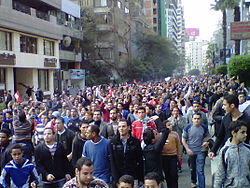
The scene lasted just seconds on our screens, a brief flash, chiseled on the retina, of thousands of people protesting on the streets of Cairo. The situation was described by the pompous voice of the Cuban announcer, who explained that the crisis in capitalism had sparked discontent in Egypt and that social differences were sinking the government. Barely mentioned was that a thirty year cycle was crumbling in a single week, right there, in a country where history is measured in four-digit numbers, wedged in pieces the size of millennia.
The allusion we used among ourselves to refer to Hosni Mubarak’s long stay in power was, as the popular refrain warns: “Don’t speak of the noose in the hanged man’s house.” The insinuation is clear: five decades of authoritarianism here at home has exceeded its expiration date. Perhaps to avoid our making the comparison, the State media showed caution in dealing with the news from North Africa. They administered tablespoon-sized doses of the events, without dwelling on the reasons that drove a people to put a limit on the personal mandate of an octogenarian.
Despite their journalistic stealth, other fragments of what is happening come to us through alternative information networks — persecuted satellite dishes and the elusive Internet. Official prudence can not prevent our seeing an aerial view of Tahir Square, vibrating to the beat of spontaneity, something not seen here for many decades in our sober and gray Plaza of the Revolution. It’s inevitable that watching the crowd demonstrating with placards and banners would make us raise question that that sober announcer, with his striped tie, wants to banish from our minds.
Why doesn’t something like this happen in Cuba? Given that our government has been in power longer and the economic collapse has become an inseparable part of our daily lives? What prevents us from taking the path of civic protest? Of exerting peaceful pressure from the streets? Egypt has shaken our docility and the courage of others has forced us to face our own apathy, in this nation where time is measured in “Revolutionary” commemorations of long-past events, tucked in the yellowing folders of the bureaucrats.
The theory of brave peoples versus cowardly peoples is simplistic. There is no gene for rebellion and one can’t predict when discontent will reach its boiling point. Since 1959 speculation on this long and narrow island has been fueled by Tarot cards, Ouija boards, rhyming quatrains, fortunetellers, babalaos and prophets. Faced with the omens of a future that never comes, millions of Cubans have summarized civic activity in one morose verb: To wait.
They cherish the illusion of a quick fix, of going to bed one night in a country without human rights and waking up the next morning in democratic Cuba. When waiting continues to be prolonged far beyond the expected time, many choose to conjugate the verb “to emigrate” or, alternately, opt for the brief and laconic syllables of “to remain silent.” But to throw themselves into the streets? No. Because the dark asphalt of the avenues belongs to whom? Since we were children we’ve been told the answer: To the Revolutionaries, to Fidel Castro, to the Communist Party. They would have us believe that to protest in public against the layoffs of a million workers, the high cost of living, or to demand the resignation of a cabinet, are actions possible only outside our borders. They have claimed the streets, our streets.
And they have activated mechanisms of control which spring from their fear. To prevent a crowd from taking to the sidewalks to shout in unison, “The president must go!” they have installed surveillance equipment that knows no economic crisis, no cuts, but constantly hovers over us. Right now they are on edge, shuffling their agents, their cars, their laws, to avoid the contagion that could come from the East. Because even though Cairo is very far away, there are too many similarities between Cubans and the faces we saw on the March of One Million. Many of us feel that those who chant against Mubarak on the other side of the screen are calling out to us, making us ashamed of our inertia.
